We present a collection of articles “Civil society in Belarus 2015-2021: from stable development to new challenges”.
Mikola Statkevich: a hero, a politician, a man

The release of political prisoners will result in improvement of Belarus’ relations with the EU and the US, but not in recognition of elections and their winner.
The authority of Mikola Statkevich is enough to launch real protest movement; but for that he needs to act counter to the plans of the Belarusan authorities — and counter to the usual petty cares of the opposition leaders.
The release of the six political prisoners, the most significant of whom is Mikola Statkevich, has already caused a wave of different interpretations regarding political importance and meaning of this event. But let’s try to put emotions and joy of the release of the unjustly convicted aside and cast aside speculative reasoning behind the logic of the Belarusan authorities in this situation. Let’s look at what is left.
Bare facts
1. Release of six political prisoners formally gives grounds for freezing the restrictive measures of the EU against Belarus. In the near future, unless new circumstances appear (conviction of the detained “graffiti artists” or mass repressions in the course of the elections), European sanctions will be suspended.
2. The release of the political prisoners doesn’t influence the course of the political campaign-2015. It doesn’t make the participation in it more politically conscious, likewise it doesn’t prove the political liberalization of the regime, likewise doesn’t make these elections more democratic, freer or more legitimate. The proper political situation is only able to appear after these elections, not during this meaningless electoral campaign.
3. Mikola Statkevich, the last of the repressed presidential candidates at the 2010 elections, went at large, which puts an end in history to the politically fatuous and dull political campaign 2010. It also takes off all moral limitations from its main heroes — now they can disclose the circumstances that have been hidden from the general public and that led to the excess of December 19, 2010.
4. Over the years of conviction Mikola Statkevich won the sympathies of numerous (if not the majority) of political opponents of the current regime with his manly and firm behaviour. Statkevich didn’t give up, he didn’t ask Lukashenko to pardon him, and by this he won an absolute moral victory. Statkevich went at large as a hero and the symbol of resistance.
5. Mikola Statkevich enters an almost free and non-occupied by other politicians field. None of the actual candidates can be taken seriously, likewise Uladzimir Niakliaeu, who is the most popular according to the opinion polls, after his leaving-coming back to the politics. It is at Statkevich that the eyes of all those who don’t see any prospects in this political campaign will be looking. It is he who will be expected to give the answers about the plan and strategy of further actions of the opposition.
In result, this event causes important consequences for the foreign political situation, but basically doesn’t change anything in the internal situation of the country. Possible inner political consequences will depend on what will Mikola Statkevich do or not do.
External outline
Thus, Belarusan authorities and their accomplices, despite all their statements and actions, were unable to do anything to lift sanctions and renovate real cooperation with the EU without the release of the political prisoners. Lobbying of some EU countries for the removal of sanctions, similar attempts of a number of CSOs in Belarus, change of geopolitical situation due to the military aggression of Russia against Ukraine, meetings of the “Normandy four” in Minsk, “Minsk agreements”, and other foreign-policy “breakthroughs” were of no use.
All that was happening in Belarus-EU relations from November 2013 was a diplomatic dialog, adjustment of opinions, and development of plans for further cooperation, not real actions. EU has never removed the demand to release political prisoners, and, accordingly, it is only now, with their release, that prospects for real projects and programs of cooperation are opening.
The release of political prisoners is not a basis for recognizing the legitimacy of the Belarusan political regime. Apart from that, soon new political prisoners might appear: the arrested “graffiti artists” have already been recognized as such by the human rights fighters.
The fact of release also hardly affects the chances for recognizing the elections as free and democratic by the international community. For that the election should be conducted in accordance with the international standards, which cannot happen through the logic of the authoritarian regime’s work.
But the situation where there are no political prisoners characterizes the context of election as more positive. Alongside with the free collection of signatures, higher liberality during the election campaign, etc. it will be recognized “the improvements of the election process” by the OSCE observers.
If something similar to December 19, 2010 doesn’t happen, the final assessments will mark non-recognition of elections, including their winner, but we’ll see the ascertaining of the “significant progress” or at least “progress”. And that will be enough for normalization of Belarus’ relations with the EU and the US.
A hero and Square
Mikola Statkevich went at large as a hero and a symbol. In this quality he draws hopes and expectations of quite numerous amount of people, who are ready to take up his call. Potentially, it creates a possibility to gather if not mass Square protests, then at least enough people for protests on the day of the elections.
In his recent interviews Statkevich emphasizes the right of citizens to peaceful protest and “doesn’t understand fear of the Square”. The hero will be at the Square, but because of that the protest won’t be more controllable and organized, which creates a potentially dangerous situation.
Yet again everything will be in the hands of the Belarusan authorities, i.e. those who provoked the excess in December 2010. And that means that provocations, mass arrests, and new political prisoners are possible again. That will be enough to stop any normalization of relations with the EU and the US.
A politic and the environment
The creation of a politic as an image on TV and a symbolic persona doesn’t depend barely on the behaviour of a real politic, but also on the efforts of the team of people around him. The way in which Mikola Statkevich will be acting depends not only on his own understanding now, but also on the manner of situation and actions suggested to him by his environment.
This environment is most likely to impose standard patterns and behavioral clichés of traditional opposition on Statkevich. A year (or a year and a half at the most) of actions in the mode of repeating statements and actions typical for the former Statkevich-politician and there will be nothing left from the image of a new Statkevich-hero. Other opposition politicians will gladly help him with that.
Strategy and actions
To convert the existing symbolic capital Mikola Statkevich should act counter to the plans of the Belarusan authorities and counter to the usual petty cares of the opposition leaders. The authority of Statkevich is enough to launch real protest movement; and it can start from the moral and symbolic opposition to the mean Belarusan dictatorship. However, it cannot be done without theoretic work and serious analysis of the situation.
Mikola Statkevich and the team of his former associates have no such resource. Will they be trying to find it?
Others
-
A usual circle. No sanctions, no changes
After the abolition of the sanctions, the EU and Minsk will further expect from each other for the steps that no one is going to take. The situation in the country will not change; only the third force can affect it. If the Belarusan civil society doesn’t become this third force, then Russia will become it.
-
Letter from Minsk
Strategic Europe continues the second phase of its Capitals Series exploring how EU foreign policy is viewed by six countries in Europe’s Eastern neighborhood. Carnegie Europe asked contributors from each capital to give a candid assessment of the EU’s policies toward their country, with a ranking on a scale from “miserable” to “excellent.” The spotlight is on Belarus.
-
The Year of Belarusan thinking in the Flying University
We publish the speech of Tatiana Vadalazhskaya, a coordinator of the Flying University, during the first session of the university seminar in the 2015-2016 academic year.
-
Academic non-freedoms
In order to join the Bologna process in practice, Belarus needs institutional structural changes.

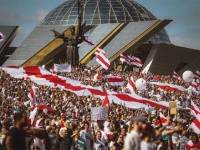
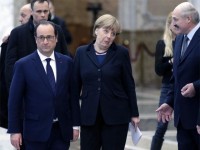
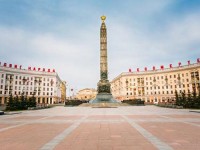
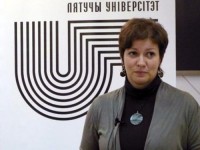
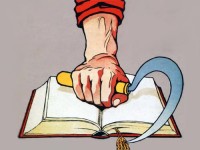


Comments
Andrei Yahorau — Al Jazeera: “Lukashenko is irresponsible”
He said Belarus would likely face economic tightening not only as a result of the coronavirus pandemic but also a Russian trade oil crisis that worsened this past winter.